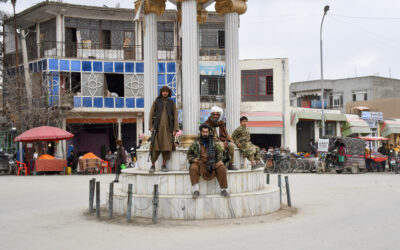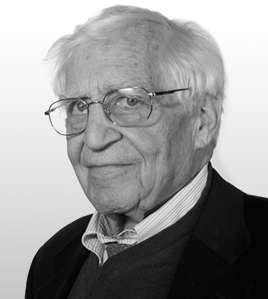Pulitzer Prize Winning Journalist Walter Pincus is a contributing senior national security columnist at The Cipher Brief. Pincus spent forty years at The Washington Post, writing on topics from nuclear weapons to politics. He is the author of Blown to Hell: America’s Deadly Betrayal of the Marshall Islanders (releasing November 2021)
OPINION — Given these troublesome days, there’s a need for some inspiring words.
“We’re at one of those inflection points where what we do now will set the course for the generation to follow—and if we do what we must, we will create some cool opportunities for future intelligence professionals.”
That was former Principal Deputy Director of National Intelligence Sue Gordon, speaking on September 25, as she accepted the William Oliver Baker Award, given by the Intelligence and National Security Alliance, for sustained contributions to excellence in intelligence and national security affairs.
“This is an amazing community that has delivered for the nation time and again,” she said in summing up her stellar, almost 40-year career, 25 years with CIA, then as Deputy Director of the National Geospatial-Intelligence Agency (NGA) and finally the PDDNI job.
Former DNI James Clapper, in describing her, said “I never saw one case in my interactions with Sue where she was not optimistic about something; that there is a way to solve a problem; there is a way to persuade people to do the right thing; and she was unfailingly consistent in that in all my dealings with her.”
“She is one of the most innovative and creative people I know,” was former CIA Deputy Director Mike Morell’s view. “In a large bureaucracy those people can be beaten down. She never let that happen to her. Rather, she has this unique ability to think outside the box and still get things done,” he added.
Two other facts are worth knowing. Her father was Vice Admiral Robert Monroe, once head of the Defense Nuclear Agency, so there’s a family history of public service. And she was the only Duke University women’s basketball player that was team captain for three straight years.
She told the award dinner crowd she took “the [CIA] job…while I figured out if I wanted to go to law school or get my PhD in biomechanics.” She had been a zoology major at Duke and hired by the agency to be a “Soviet biological warfare analyst.” After the eleven-month wait to get her security clearance, she arrived at Langley to find her initial job had been eliminated by budget cuts so she had to find another role. Her first performance appraisal, which she announced she remembered “exactly,” read: “With help, she might turn into a decent intelligence officer one day.”
Engage personally with former PDDNI Susan Gordon at The Cipher Brief Threat Conference October 24-26. If you are an actively working in the national security field, we invite you to apply to attend. Seats are limited.
But Gordon became more than that, explaining with a smile: “I must have gotten a lot of help, because from that beginning: I got to work with Sally Ride [the astronaut]. I got to brief President Reagan. I got to find bugs in the new embassy being built in Moscow. I got to participate in building a first ever, one-of-a-kind spacecraft. I got to help design a new, in-place sensor that did its work real-time for the first time ever…Man, that was a good gig for a GS-10. I got to start a new office, imagine a non-profit company that got us access to Silicon Valley [In-Q-Tel for CIA to invest in tech companies]. I got to think about cyber differently. I got the awful honor of bringing patriots home for the last time on the tarmac of Dover [Del.]. I got to be part of NGA when we were figuring out whether we could succeed in the open and I got to keep the NRO [National Reconnaissance Office] from being subsumed by the Space Force.”
Having looked back, she described herself as “simply grateful for a career that I had no right to expect, but that fulfilled me every day; grateful for the humans who taught me so much and showed me such grace along the way.”
By name, Gordon listed 18 people who had helped her, describing them as “bosses who trusted me with more than I knew I could do.” As a leader she said she could take risks “because no matter how far I aimed, my women and men would never, ever let me down. Really, if you know me as someone who took risks, understand that I could because of our people—let that be a lesson to you.”
In another memorable line, she called her career a “testament to our [intelligence] community that values performance over pedigree, and if you can play, you can play…I pray we stay that way.”
Go beyond the headlines with expert perspectives on today’s news with The Cipher Brief’s Daily Open-Source Podcast. Listen here or wherever you listen to podcasts.
When she talked about today, Gordon said, “These are remarkable times. And though they may seem daunting, they are like a few before when we have had to pivot to the realities of new conditions and threats.”
She noted that two of the changes the intelligence community had to deal with: The digital world that made things “so different, mostly because of the reach and speed that it makes possible,” and “the rise of economic factors as dominant—and the result of them on adversaries, competitors, and partners.”
In true Gordon fashion, she suggested what still needed to be done going forward from 2021: “Be masters of the digital realm…our craft needs to be digitized. Quit dithering on open source and embrace it. It’s just data. Policies aren’t sacrosanct—don’t let them stop the right thing from happening, make new ones that will. Get on with partnering across sectors and agencies and nations—we need each other, but it will not work if we expect each to fit into the other with no give.”
I have to point out that here she did, in an aside to the audience, say, “I meant to get to each of these in my last job (PDDNI), but my time was cut short,” meaning she retired after Trump failed to appoint her, even temporarily, to replace DNI Dan Coats, who left in August 2019.
Gordon’s challenge to her intelligence community audience was, “Be big. Be audacious. Not big in size, not adding numbers, adding aim, we can do it. Be big because that’s who we are, that’s our heritage. Plus, there’s no percentage in being small, and it [big] is more fun.”
She also told the audience of some 700 people a story about being asked in 2007 to be the senior champion for the ANGLE [Agency Network for Gay, Lesbian, Bisexual, and Transgender Officers and Allies] program. She said yes; then told the audience, “I have no idea if I gave anything to the LGBTQ community, I don’t. I do know they transformed me. Don’t be narrow in what you ask of them. Don’t be narrow in who you ask.”
She closed by saying, “We have big challenges, but we have better opportunities. Remember who you are, why we are here, and we will be celebrating together for years to come.”
Sue Gordon was not the only former senior intelligence official whose recent words are worth recording.
The Cipher Brief hosts private briefings with the world’s most experienced national and global security experts. Become a member today.
Former CIA Director and Defense Secretary Robert Gates recently talked about “the ugly nature of the public debate today, the divisiveness in our country” and “the role of the citizen in making government work,” during a September 21, Center for Strategic and International Studies-sponsored discussion on civics as a national security imperative with former CIA Attorney Suzanne Spaulding.
“Several of our Founding Fathers, Benjamin Franklin, John Adams and others all wrote very specifically that the democratic experience, the building of the republic and its sustainment depended entirely on having an educated public,” Gates said.
“They didn’t just mean STEM (science, technology, engineering, mathematics),” Gates continued, “They meant a public that understood the nature of the government and the role of the citizen, and the engagement of citizens in their government and operations of government.”
He said the disappearance of teaching civics, particularly in high schools, has “had a deleterious effect on the country.”
Gates then brought up a point he said he tries to make in all his speeches: “We hear all the time about our rights as citizens – everyone talks about our rights. Virtually no one, including our political leaders, talks about the obligations of citizenship.”
He said, “Frankly, one of the reasons that we’re in the real bind we’re in nationally right now is that particularly in the political parties’ primaries, there actually is pretty small participation. And so relatively extreme people in both the Republican and Democratic parties can dominate the primaries, so that come November and the elections a lot of people who haven’t been engaged in the process say how did we end up with these candidates?”
“Well, the reason they ended up with those candidates was their lack of engagement six, eight or nine months before when the decisions were being made about who the candidates would be,” Gates said, adding, “So this is why engagement is so important.”
Another lesson Gates said needed to be taught was that “the American system only works through compromise. The Constitution itself is really a bundle of really big compromises,” he said. “Nobody always gets their way all the time in a real democracy.”
Gates went on, “I think most Americans, by far a majority, are probably center-left, center-right, they are not on the extremes. And when you have the kind of polarization and paralysis we do today, because of the lack of engagement of the broad citizenry, it has broad national security implications. It creates the opportunity for disinformation by the Russians and Chinese. It has an impact internationally that the United States cannot govern itself. This is a big theme of the Chinese right now — the United States model of government doesn’t work.”
He closed by referring to the January invasion of the Capitol that interfered with the Congress’ acceptance of the electoral vote count that cemented President Biden’s election saying: “Frankly I think we can use the events of January 6, as a springboard for that [civics] discussion and why it all almost fell apart at that point and how dangerous that was.”
Words help. What action follows is more important.
Read more expert-driven national security insights, perspective and analysis in The Cipher Brief










